Eating to Sleep
Nutrition: A Silent Influencer on Restful Sleep
Recognizing the value of a good night’s sleep is akin to discovering a hidden treasure – elusive yet incredibly precious.
Poor sleep is linked to a host of health issues including heart disease, high blood pressure, diabetes, mood disorders, and obesity.
Consider this: what if I shared that the key to mastering the sleep game is right where you are…tucked away inside your fridge and pantry?

I used to be a lousy sleeper, and when I don’t pay attention, I can still fall back into old habits that contributed to my poor sleep…such as scrolling on my phone in bed, drinking coffee too late in the day, eating too many carbs in my diet, and eating too late in the day.

However, nutrition does emerge as the unsung hero in the pursuit of quality sleep. So, let’s explore the profound connection between what you eat and the journey to a peaceful night’s rest.
Balancing Macronutrients
Let’s start by delving into the trio of nutrition essentials – carbohydrates, proteins, and fats.
Why are carbohydrates important for deep sleep?

Tryptophan is an amino acid that is important to produce serotonin in the body. Tryptophan is also key to brain function and has a role in healthy sleep. Serotonin is the precursor to melatonin, which in turn helps regulate our circadian rhythms and therefore sleep. The body doesn’t produce tryptophan naturally; it must be obtained from the food we eat. While most serotonin is made in the gut, a smaller amount is produced in the brain. Tryptophan-rich foods are most effective when paired with carbohydrates, facilitating its journey to the brain to generate serotonin. Imagine incorporating whole grains, legumes, and vegetables such as green beans or spinach into your evening, setting the stage for relaxation and sweet dreams.

Proteins, acting as nocturnal superheroes, supply amino acids vital for neurotransmitters like dopamine and norepinephrine and of course tryptophan. Opt for lean protein sources like poultry, fish, or tofu as well as eggs to ensure a steady release of these sleep-inducing chemicals. Again, the combination of carbs together with proteins enhances the availability of tryptophan, the melatonin magician – our naturally occurring sleep aid.
Including omega-3-rich fats from sources like fatty fish (such as wild-caught salmon or tuna), flaxseeds, and walnuts in your diet can have anti-inflammatory benefits that positively influence sleep.
Fatty fish, recognized for their Vitamin D content, have been linked to sleep issues. Vitamin D deficiency can impact melatonin production and disrupt our natural sleep-wake cycles.
Obstructive Sleep Apnea (OSA), a commonly undiagnosed sleep disorder, carries potential risks such as depression, reduced attention and memory, impaired sexual function, and even heart disease. Omega-3s come in three main types: DHA, EPA, and AHA. Low levels of omega-3 DHA are associated with OSA.
DHA also aids in stimulating melatonin production—the essential hormone for promoting sleep. Research indicates that insufficient levels of omega-3 DHA contribute to melatonin deficiency.

Incorporating whole food carbohydrates, proteins and healthy fats is crucial for cultivating a well-rounded diet that sets the stage for a restful journey into dreamland. By striking the right balance among these macronutrients, we lay the groundwork for a diet that nurtures the complex processes that are needed to enjoy a peaceful and rejuvenating night’s sleep.
Micronutrients and Sleep
What about specific foods that will aid in better quality sleep?
Enter the unsung heroes of nutrition – micronutrients.
Magnesium
Magnesium, which is found in leafy greens, nuts, and seeds, possesses muscle-relaxing properties that can transform tension into relaxation for a more comfortable sleep. It also assists with calming the nervous system and blood sugar control helping ensure a restful night’s sleep.
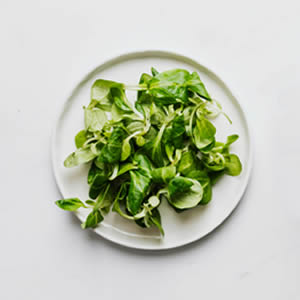
Vitamins B6 and B12
Vitamins B6 and B12, which are present in chickpeas, lentils, liver and eggs aid in the production of serotonin and melatonin – the dynamic duo for circadian rhythm and subsequent restful night. Word of caution: take B Vitamins during the day as taking them in the evening can actually prevent falling asleep.
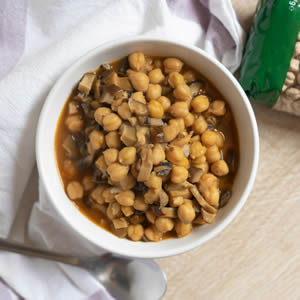
Vitamin D
Vitamin D, especially from oily fish, liver, and mushrooms help regulate circadian rhythm.
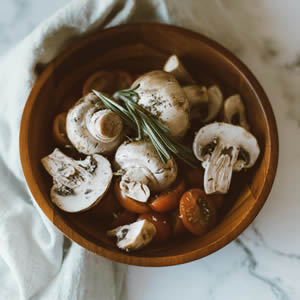
Zinc and Iron
Zinc and iron, such as in eggs, soybeans, black beans and wholegrain oatmeal are silently working in the background to support neurotransmitter systems.
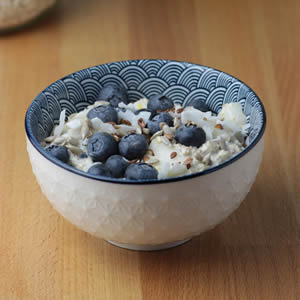
Tryptophan
Tryptophan is an amino acid found in foods that contain protein; it is one of the nine essential amino acids that cannot be made in our body; we have to get it from our food.
Tryptophan is a precursor to melatonin; a hormone which regulates our sleep-wake cycles. Great sources of tryptophan include turkey, tofu, beef, lamb, dairy, cashews, almonds, and quinoa.
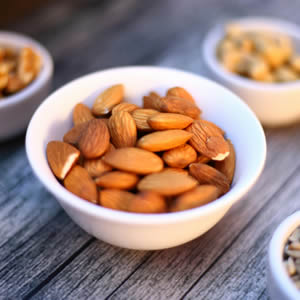
Melatonin
Melatonin is a hormone that is crucial for sleep regulation and setting our circadian rhythms. It is found naturally in cherries, especially tart cherries as research indicates that tart cherries may contain six times more melatonin than sweet cherries. Drink a glass of tart cherry juice an hour before bedtime to encourage falling asleep sooner.


Delicious Evening Sleepy Cherry Smoothie
- 1 cup frozen dark cherries
- ½ banana
- handful of spinach
- 1 cup coconut or almond milk
- 1 tsp vanilla extract
- 3-5 ice cube
Blend and enjoy!
In essence, understanding and maintaining the delicate balance of these micronutrients is like fine-tuning the gears of a well-oiled machine— having too much can lead to potential disruptions, and too little may result in inadequate support.
Furthermore, insulin (our body’s response when we eat) also works with our circadian rhythm so for a blissful night’s sleep, it is vital to STOP eating three to four hours prior to bedtime. This will help prevent blood sugar spikes in the night.
"One cannot think well, love well, and sleep well if one has not dined well."
– Virginia Wolf
Hydration and Caffeine
Now, let’s touch upon hydration and the caffeine conundrum…

When we go to bed hydrated, our core temperature is better regulated, and we are more likely to feel sleepy. Maintaining proper hydration is like giving your body a high-five, promoting overall health, including sleep. However, exercise caution with excessive liquid intake close to bedtime to avoid unexpected midnight bathroom adventures.
As for caffeine – that rebellious companion in your cup – be mindful of its intake, especially as the day winds down.
I absolutely love everything about my ritual morning coffee as I sit at my kitchen counter and partake of that elixir of mood boosting caffeine that wakes me up and gets me focused for the day!

However, whether it’s coffee, tea, or chocolate, limiting consumption and not consuming caffeine later in the day (preferably after 12 noon) can prevent this beloved stimulant from gatecrashing your sleep party.
To sum it all up...

The key to achieving great sleep is right on your plate. A natural, whole foods diet packed with essential nutrients is your passport to a restful night. Tune into your body’s signals through your taste buds and acknowledge your unique nutritional needs. Alongside that, maintain a consistent sleep schedule and evening routine, add a dash of exercise, and a sprinkle of stress management for a holistic approach. As ongoing research consistently uncovers more about the connection between nutrition and sleep, let’s embrace the journey of integrating food choices into our strategies for better sleep. So cheers, and here’s to a blissful night of rejuvenating sleep!
Additional Resources
- Sleep Disorders and Sleep Deprivation: An unmet Public Health Problem 3 Extent and Health Consequences of Chronic Sleep Loss and Sleep Disorders (2006) Institute of Medicine (US) Committee on Sleep Medicine and Research; Colten HR, Altevogt BM, editors. https://www.ncbi.nlm.nih.gov/books/NBK19961/
- Ladesich JB, Pottala JV, Romaker A, Harris WS. Membrane level of omega-3 docosahexaenoic acid is associated with severity of obstructive sleep apnea. J Clin Sleep Med. 2011 Aug 15;7(4):391-6. doi: 10.5664/JCSM.1198. PMID: 21897776; PMCID: PMC3161771.
- National Sleep Foundation (2020 Nov 12); The Link Between Nutrition and Sleep
- Faris M. Zuraikat,1,2 Rebecca A. Wood,2, Rocío Barragán,1,3,4 and Marie-Pierre St-Onge 1,2; Sleep and Diet: Mounting Evidence of a Cyclical Relationship First published as a Review in Advance on August 4, 2021 https://doi.org/10.1146/annurev-nutr-120420-021719
Subscribe to
Support Your Wellness Journey
Enter your email to be notified when new articles are published.
